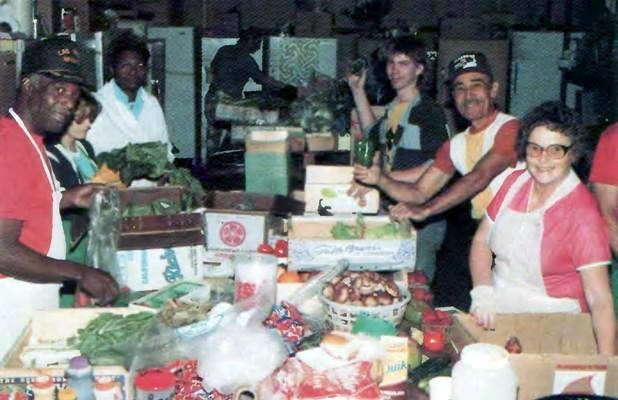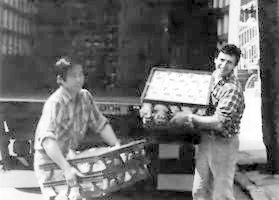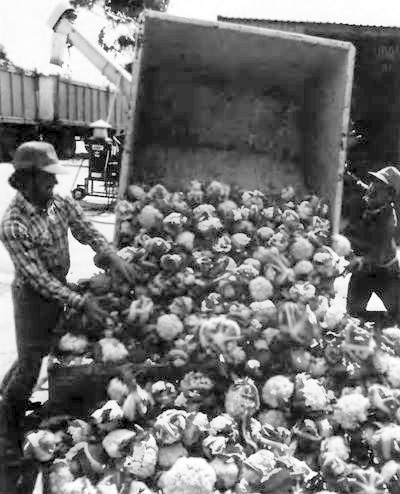![]()
The Words of the Macijeski Family
|
|
The Words of the Macijeski Family |

The
Gleaners of Las Vegas: America's number one food bank at work.
Hunger is perhaps the most basic problem of all humankind. Many missionaries have found that before giving spiritual nourishment to people, they first have to provide physical food. How difficult it is to think of God when you don't know where your next meal is coming from!
In America, it seems especially unnecessary and shameful that so many go hungry in the world's richest nation. Perhaps it is a symptom of how far apart from one another we have drifted in this country -- millions of pounds of wholesome food are allowed to decay, often in the same neighborhoods where families suffer from malnutrition.
Both our True Father and the President of the United States have called for a volunteer effort to help solve America's hunger problem. Churches, especially, have a spiritual and moral responsibility, as ambassadors of Christ, to serve and care for the community with a loving and parental heart; what good parent allows his children to go hungry? The development of programs that can effectively deal with hunger in America is, I believe, the first step towards ending hunger worldwide and creating a foundation for God's substantial Kingdom on earth.

New
York City volunteers distribute muffins on Staten Island, New York.
Towards that goal, Unification members all over the United States have begun food distribution work in their own cities. Despite the fact that centers have had very little time or manpower to devote to food distribution, church members in conjunction with local churches and community organizations helped distribute over 5 million pounds of food in the first three months of 1985!
Last year 250 trucks were donated by the Unification Church to the International Relief Friendship Foundation (IRFF) to help in social action work in the United States. The IRFF Truck Office has kept records of the amount of food these trucks have transported. According to these records, in the first quarter of 1985 the following states led the nation in IRFF-related food distribution:
#1 -- California 1,434,400 pounds
#2
-- Nevada 1,050,000 pounds
#3 -- Colorado 535,600 pounds
#4 --
New York 433,779 pounds
#5 -- Florida 282,035 pounds
#6 --
Illinois 228,200 pounds
#7 -- Arizona 212,800 pounds
#8 --
Washington State 210,000 pounds
#8 -- Arkansas 210,000 pounds
#9
-- Massachusetts 100,000 pounds
#10 -- Tennessee 98,624 pounds
In many of these cases Unification Church members were only a part of a larger service 'chain' involving various other organizations, which in many instances were actually the main organizers of the activities. These totals should not be regarded as tallying the amount of food IRFF or the Unification Church distributed alone, but also the amount of food we helped distribute in cooperation with other organizations.
Exactly how are church members working around the country to distribute food? Since considerable freedom was allowed in terms of how members might choose to set up their programs locally, different patterns of food distribution have emerged. However, there do seem to be three basic types of set-ups: (1) The most common way is for Unification Church members to form one link of a chain of service organizations involved in the food distribution process; this chain frequently involves churches, food banks, National Council for Church and Social Action (NCCSA) chapters, and local government. (2) In some areas, our members have chosen to help large, successful, well-organized programs that already exist. A prime example is the Gleaners, Inc., in Las Vegas. (3) In a few cases, members have chosen to establish and manage their own organizations, such as Project Volunteer in the California Bay Area and in Chicago.
In the San Francisco/Oakland Bay Area of California, Project Volunteer has grown steadily since its inception in 1975 to become the church's number one food distribution program in the country; this project alone distributed over one million pounds of food in the first three months of this year. Project Volunteer works from a large warehouse facility to serve a network of over sixty organizations, which are often run by volunteers who receive the project's services. Utilizing a full-time staff directed by Mr. Robert Dilg, Project Volunteer now has a fleet of five trucks, two of which are presently being converting into flatbed vehicles in order to transport fresh produce from the fields. A Project Volunteer tradition is the annual "Salute to Community Servants" awards evening, which honors those who have pitched in to help make the project a success. Now an important element in the Bay Area's anti-hunger campaign, Project Volunteer's success is a testimony to what can be done through years of hard work and consistent effort.

Members
of Project Volunteer in California prepare a load of fresh produce
for shipment.
In Arkansas, ambitious beginnings have been made. Members in Little Rock used their new IRFF truck to deliver a huge walk-in freezer donated by a local Burger King to the Arkansas Food Bank, and have been participating in a monthly United States Department of Agriculture (USDA) food distribution program. Recently, members took part in a "Community Pride Day" held by Concerned Citizens United for Decency, a group that had previously collected 2,500 petition signatures against pornography shops in Little Rock. Local residents staged a neighborhood cleanup this spring, and collected a full truckload of abandoned furniture, used tires, decaying rugs, dead branches, and other trash that had been collecting on abandoned lots and other sites throughout the neighborhood. After the cleanup, free doughnuts from the Arkansas Food Bank network and drinks from McDonald's were enjoyed by the participants at a local church. In West Memphis, Arkansas, Rev. William Smart used one of our trucks to deliver an estimated 200,000 pounds worth of USDA food to needy local residents during the first quarter of 1985.
According to IRFF, New York City's program ranked third among cities in the nation in the first quarter of this year. New York's method of operating is one of the best examples of the chain-of-service program that is becoming the most common set-up around the country. Headed by Mr. Bobby Wagner of the New York Unification Church, a crew of about ten brothers picks up food from local area donors or USDA offices. They then deliver the food to a growing network of over 120 churches and organizations, which in turn distributes the food to the area's poor. The New York City members have been exemplary in helping other cities in the area begin distribution programs of their own, by hauling truckloads of surplus food from New York to six other major cities in the Northeast. They use a fleet of five trucks, and they are hoping to get more soon.
The Gleaners, Inc. of Las Vegas, Nevada, cited by President Reagan as America's number one food bank, has been using our trucks regularly since the beginning of the year to help in its massive pick-up and distribution operations. Several members of the Las Vegas Unification Church help the Gleaners in their work every day. Mrs. Celeste McKinley, who heads the Gleaners, is also a founding member of the Independent Network of Food Organizations (INFO), a new national food bank network which she hopes can begin using our trucks and volunteers all over the country.
But we are just beginning. The figures in the first quarter represent only a small fraction of what church members can do.
If so much can be done by a small percentage of our membership, the possibilities are limitless once more and more members all over the country become involved in social action work.
Any of these patterns, or other ones, can be successful, depending upon their suitability to local need and the quality of their management. Actually, this pattern of researching local need and networking with other local groups was one of the few guidelines given when the trucks were sent out, and it seems to be bearing fruit. Father, after all, is the one who has encouraged us to serve other churches and organizations. As we seek to develop and unite the many different styles of programs across the country, let us ask God's guidance to help us build a network of service that is both united in heart and as diverse as the people it serves.